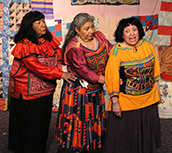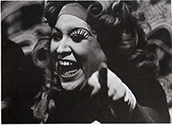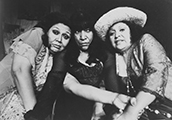Lisa Mayo (1924-2013) was a major figure in the Native American theatre community. Lisa
Mayo was born and raised in Brooklyn, New York and trained professionally as a mezzo soprano
at the New York School of Music. She studied with such prominent teachers as Uta Hagen and
Charles Nelson Riley. Lisa Mayo, along with sisters Muriel Miguel and Gloria Miguel, were
the founding members of the Spiderwoman Theatre in 1976. The company is known for being the
oldest and longest continuous feminist theatre in the United States. With the founding of
Spiderwoman Theater, Mayo moved away from the commercial scene and focused more on original
works with her sisters and other Native women. They created a technique called
Practitioners
Mayo, Lisa
Practitioner

Lisa Mayo: Between the Layers is an interview reflecting on the training, accomplishments, experiences, and the life of Lisa Mayo.
Related Items
Lisa Mayo of the Kuna and Rappahannock Nations was a founding member of the Native
American women’s feminist theatre group, Spiderwoman Theater. She was a singer,
actor, and playwright who wrote and performed with Spiderwoman Theater for 35
years.
Lisa Mayo: Between the Layers is an interview reflecting on the training, accomplishments, experiences, and the life of Lisa Mayo.
Sun, Moon and Feather presents a musical comedy-documentary about three Native American sisters growing up Native in an Italian neighbourhood in Brooklyn during the 1930s and 1940s.


